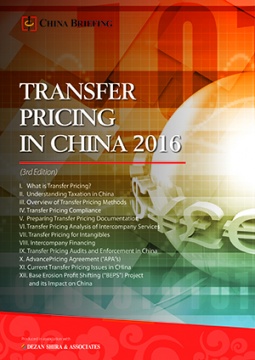Transfer Pricing in China – New Report from Dezan Shira & Associates
 Transfer Pricing in China, the latest report from Dezan Shira & Associates, is out now and available through the Asia Briefing Bookstore for complimentary download. When a business transaction occurs between businesses that are controlled by the same entity, the price is not determined by market forces, but by the entity controlling the two businesses. This is called transfer pricing. An example is a transaction between a parent and its subsidiary, or other intra-group transactions.
Transfer Pricing in China, the latest report from Dezan Shira & Associates, is out now and available through the Asia Briefing Bookstore for complimentary download. When a business transaction occurs between businesses that are controlled by the same entity, the price is not determined by market forces, but by the entity controlling the two businesses. This is called transfer pricing. An example is a transaction between a parent and its subsidiary, or other intra-group transactions.
These transactions can be used to shift funds – and thereby profits. Such transactions can serve as a tool for finance and tax planning.
Content:
- How Does Transfer Pricing Work?
- The Risks and Requirements of Transfer Pricing
- Transfer Pricing Services from Dezan Shira & Associates
China’s foreign currency control regulations only allow one dividend issuance to a foreign entity a year. Moving funds out of China by using inter-company transactions can then offer a solution.
In this report on transfer pricing, we discuss what types of transactions foreign investors can use to shifts funds in this way. Double taxation agreements between countries play an important role in transfer pricing. These allow foreign investors considerable tax savings when using offshore holding companies – under certain conditions.
Intra-group transactions often serve a legitimate purpose, but tax authorities around the world are wary of their use in lowering corporate profits. China is no different. Like in other countries, the Chinese tax office sets standards as to what transactions are acceptable. Those that do not meet these standards are not recognized.
If done properly, transfer pricing can save a foreign investor a substantial amount on their tax bill. However, careful planning is advised: transfer pricing transactions are under special scrutiny. In case of non-compliance, the back taxes and penalties can be severe.
Dezan Shira & Associates can assist your company in planning transfer pricing transactions, and furnishing the required documentation. If you would like to learn more about transfer pricing and how we might assist you, please do not hesitate to contact us.
|
Asia Briefing Ltd. is a subsidiary of Dezan Shira & Associates. Dezan Shira is a specialist foreign direct investment practice, providing corporate establishment, business advisory, tax advisory and compliance, accounting, payroll, due diligence and financial review services to multinationals investing in China, Hong Kong, India, Vietnam, Singapore and the rest of ASEAN. For further information, please email china@dezshira.com or visit www.dezshira.com. Stay up to date with the latest business and investment trends in Asia by subscribing to our complimentary update service featuring news, commentary and regulatory insight. |
![]()
 Transfer Pricing in China 2016
Transfer Pricing in China 2016
Transfer Pricing in China 2016, written by Sowmya Varadharajan in collaboration with Dezan Shira & Associates and Asia Briefing, explains how transfer pricing functions in China. It examines the various transfer pricing methods that are available to foreign companies operating in the country, highlights key compliance issues, and details transfer pricing problems that arise from intercompany services, intercompany royalties and intercompany financing.
 Annual Audit and Compliance in China 2016
Annual Audit and Compliance in China 2016
In this issue of China Briefing, we provide a comprehensive analysis of the various annual compliance procedures that foreign invested enterprises in China will have to follow, including wholly-foreign owned enterprises, joint ventures, foreign-invested commercial enterprises, and representative offices. We include a step-by-step guide to these procedures, list out the annual compliance timeline, detail the latest changes to China’s standards, and finally explain why China’s audit should be started as early as possible.
Managing Your Accounting and Bookkeeping in China
In this issue of China Briefing, we discuss the difference between the International Financial Reporting Standards, and the accounting standards mandated by China’s Ministry of Finance. We also pay special attention to the role of foreign currency in accounting, both in remitting funds, and conversion. In an interview with Jenny Liao, Dezan Shira & Associates’ Senior Manager of Corporate Accounting Services in Shanghai, we outline some of the pros and cons of outsourcing one’s accounting function.
- Previous Article China’s New ‘Family Planning’ Regulations: What They Contain and How They’ll Affect Foreign Businesses
- Next Article Tax Considerations for Your Software Business Structures in China










